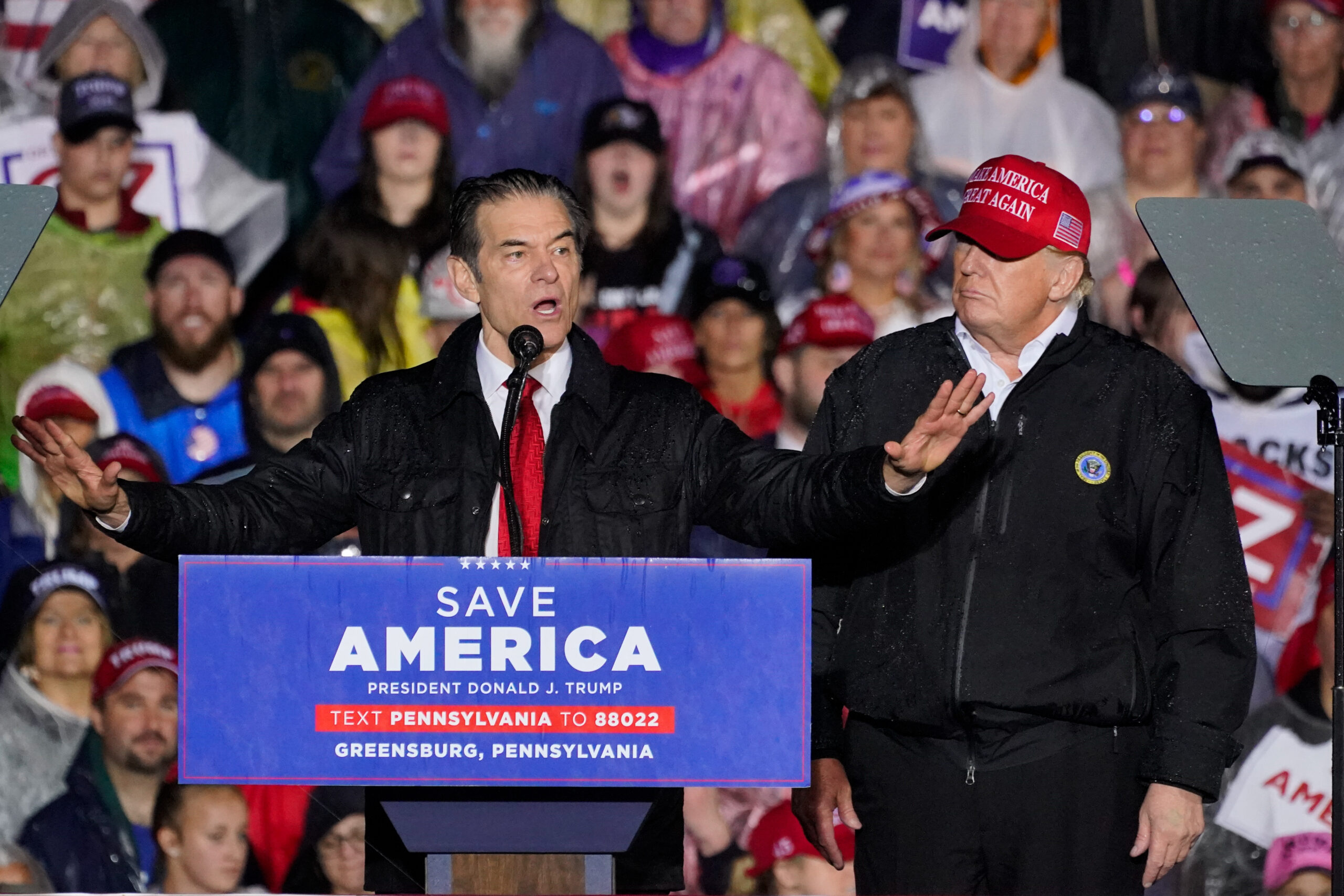Tuesday’s mixed congressional primary results suggest
former President Donald Trump’s
grip on
Republicans
is weakening but still strong — and that it may take longer than is good for the party and the country to shed his baneful influence.
In Pennsylvania, the most scrutinized state, Mehmet Oz, who was endorsed by Trump,
is locked in close combat
with Dave McCormick, with the race so tight that it will apparently trigger a recount. Whoever wins, neither will be able to claim an impressive triumph. If Oz squeezes through, it’ll be a victory for Trump but hardly a thumping one.
A late surge and fade in the same race by Kathy Barnette, an oddball candidate, further muddies the picture. She claimed, with some justification, to be more authentically MAGA than the two less erratic, but still “America First” men. Did she siphon votes away from a Trumpy base for whom the former president is neither the necessary future of the party nor as important in himself as the populist ideas and attitudes he embodies?
At the same time,
Doug Mastriano
won Pennsylvania’s GOP gubernatorial primary, leading from start to finish, despite or maybe because he joined the Jan. 6 MAGA storming of the Capitol building and wholeheartedly worked to reverse President Joe Biden’s “stolen” election victory.
Yet his easy win is far from clear evidence of Trumpian influence. Not only do Republican leaders fear he can’t take the state in November, but in endorsing him, the former president lent no real or necessary strength to the campaign. Trump merely jumped on a winning bandwagon. He wanted to boast of at least one victory even if Oz lost, so he cynically and self-interestedly gave his endorsement just days before Mastriano’s canter to the finish line. That shows weak neediness.
Elsewhere, Trump also fell short.
Idaho Gov. Brad Little
beat Lt. Gov. Janice McGeachin in the gubernatorial primary of a deep-red state — an establishment candidate fending off the challenge of a Trump-endorsed insurgent.
And in North Carolina, the political career of Republican Rep. Madison Cawthorn
was brought to an early and perhaps permanent end
by Republican state Sen. Chuck Edwards after GOP leaders decided the Trump-endorsed and startlingly wayward 26-year-old incumbent must be ousted.
But just as Pennsylvania doesn’t evince unalloyed Trump strength, North Carolina fails to demonstrate obvious Trump weakness. Cawthorn lost mostly because he was an embarrassingly bad congressman and candidate who blundered repeatedly on the way to Election Day. And
Rep. Ted Budd (R-NC) handily won
the GOP Senate primary after Trump’s endorsement cleared the field for him — an unambiguous MAGA victory.
Critics will argue this leaves an irretrievably awful and dangerous Republican Party mired in the position of Macbeth, “in blood/stepped in so far, that, should [it] wade no more,/ returning were as tedious as go o’er.” But even those of us who don’t agree that the populist tide washed out the GOP’s principles or its ability to govern better than the Democrats must acknowledge that there are too many cranks and incompetents in its ranks who besmirch it and raise questions about its fitness for government.
The party is in a painful process of reviving itself with a less-elegant version of its Reaganite populism, which sank from view in later decades of corrupt compromise with the politico-cultural pressures and perquisites of Washington.
That corruption helped produce the Trump presidency because many blue-collar voters, the type that had been Reagan Democrats, wanted a political bulldozer to smash the establishment. They got it.
But bulldozers are useful only in the first phase of a reconstruction project to knock things down. They’re not suitable equipment for building things up again. And that is the phase Republicans need with some urgency to move toward.
As smart commenters
note
, Republicans are searching for more leaders who are genuine in the appeal of their populist policies and combativeness, but are also capable, intellectually engaged, and disciplined in their thinking and rhetoric.
They
get that
with Florida Gov. Ron DeSantis and some others. But they need it faster than Tuesday’s primary results suggest they’re getting it. For it was, on balance, a pretty good night for Trump.
A few Republican leaders seem to understand this. Former Vice President Mike Pence, for example, has endorsed Republican Georgia Gov. Brian Kemp for reelection in the state’s gubernatorial primary, while Trump is backing his opponent, former Sen. David Perdue (R-GA), who lost his seat to a Democrat in 2020. Pence’s decision to weigh in on the race is the clearest sign yet that the breach between those who want Trump (or perhaps fear the political consequences of dumping him) and those who are ready to place him on the backburner is widening.
The GOP is in excellent shape to take back control of Capitol Hill with House and Senate wins in this November’s midterm elections. But Trump’s grip needs to be prized off the party faster if it is to follow up with a victory in the presidential race of 2024.






